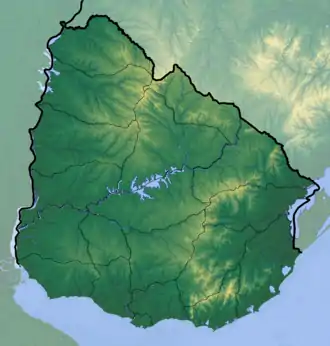| Fray Bentos Formation | |
|---|---|
| Stratigraphic range: Deseadan ~ | |
| Type | Geological formation |
| Unit of | Paysandú Group |
| Underlies | Raigón Formation |
| Overlies | Asencio Formation |
| Lithology | |
| Primary | sandstone |
| Other | siltstone |
| Location | |
| Country | |
| Extent | Paraná Basin |
| Type section | |
| Named for | Fray Bentos |
| Named by | Bossi |
| Year defined | 1966 |
 Fray Bentos Formation, Uruguay | |
The Fray Bentos Formation is a Deseadan[1] geologic formation of the Paysandú Group in Uruguay and portions of Argentina,[2] corresponding to the Paraná Basin.[3][4] It is composed of calcareous sandstones and siltstones with a pinkish-orange coloration. It outcrops in southwestern Uruguay (Canelones and Soriano Departments), the central and southeastern part of the province of Corrientes and northeast Entre Ríos.
Fossil content
The following fossils have been reported from the formation:
- Mammals
- Argyrohyrax[5]
- Cephalomyidae[6]
- Eopachyrucos[7][8]
- Fiandraia[9]
- Proborhyaena[9]
- Prohegetotherium schiaffinoi[10]
- Protypotherium[9]
- Scarrittia[11]
- Uruguaytherium beaulieui[12]
- Birds
See also
References
- ↑ Fray Bentos Formation at Fossilworks.org
- ↑ Benvenuto, Andrés (2017). "Arquitectura de facies y ambientes deposicionales de la Formación Fray Bentos (Oligoceno) en Uruguay". CSIC (in Spanish).
- ↑ Bond et al., 1998, p.42
- ↑ Tófalo & Morrás, 2009, p.680
- ↑ Hernández Del Pino, Santiago; Seoane, Federico; Cerdeño, Esperanza (2022). "New craniodental information and taxonomic decisions of the typotherians (Notoungulata) from the late Oligocene of Mendoza, central-western Argentina". Acta Palaeontologica Polonica. 67. doi:10.4202/app.00974.2022. hdl:11336/202725. ISSN 0567-7920.
- ↑ Cephalomyidae at Fossilworks.org
- ↑ Dozo, María Teresa; Ciancio, Martín; Bouza, Pablo José; Martínez, Gastón (2014). "New association of Paleogene Mammals in Eastern of Patagonia (Chubut Province, Argentina): biochronological and paleobiogeographical implications". Andean Geology. 41 (1). doi:10.5027/andgeoV41n1-a09. hdl:11336/27088.
- ↑ Reguero, Marcelo A.; Ubilla, Martín; Perea, Daniel (2003-06-17). "A new species of Eopachyrucos (Mammalia, Notoungulata, Interatheriidae) from the Late Oligocene of Uruguay". Journal of Vertebrate Paleontology. 23 (2): 445–457. doi:10.1671/0272-4634(2003)023[0445:ANSOEM]2.0.CO;2. ISSN 0272-4634.
- 1 2 3 Mones, A.; Ubilla, M. (1978). "La Edad Deseadense (Oligoceno inferior) de la Formación Fray Bentos y su contenido paleontológico, con especial referencia a la presencia de Proborhyaena cf. gigantea Ameghino (Marsupialia: Borhyaenidae) en el Uruguay. Nota preliminar". Comunicaciones Paleontológicas del Museo de Historia Natural de Montevideo. 7 (1): 151–158.
- ↑ Prohegetotherium schiaffinoi at Fossilworks.org
- ↑ Scarrittia at Fossilworks.org
- ↑ Uruguaytherium beaulieui at Fossilworks.org
- ↑ Devincenzia gallinali at Fossilworks.org
- ↑ Devincenzia pozzi at Fossilworks.org
Bibliography
- D. Perea, P. Toriño, and M. R. Ciancio. 2014. La presencia del Xenartro Palaeopeltis inornatus Ameghino, 1894, en la Formación Fray Bentos (Oligoceno Tardío), Uruguay. Ameghiniana 51(3):254-258
- M. Ubilla, D. Perea, and M. Bond. 1994. The Deseadan Land Mammal Age in Uruguay and the report of Scarrittia robusta nov. sp. (Leontiniidae, Notoungulata) in the Fray Bentos Formation (Oligocene - ? Lower Miocene). Geobios 27(1):95-102
- Bond, Mariano; Guillermo López; Marcelo A. Reguero; Gustavo J. Scillato Yané, and María G. Vucetich. 1998. Los mamíferos de la Formación Fray Bentos (Edad mamífero Deseadense, Oligoceno Superior) de las provincias de Corrientes y Entre Ríos, Argentina. Asociación Paleontológica Argentina. Publicación Especial 5. 41–50. Accessed 2018-09-12.
- Tófalo, Ofelia Rita, and Héctor J.M. Morrás. 2009. Evidencias paleoclimáticas en duricostras, paleosuelos y sedimentitas silicoclásticas, del Cenozoico de Uruguay. Revista de la Asociación Geológica Argentina. 674–686. Accessed 2018-09-12.
This article is issued from Wikipedia. The text is licensed under Creative Commons - Attribution - Sharealike. Additional terms may apply for the media files.